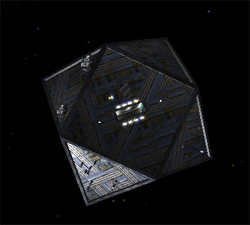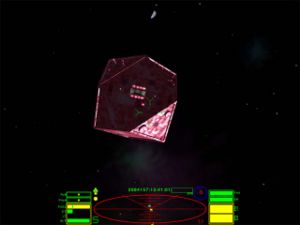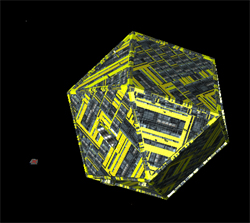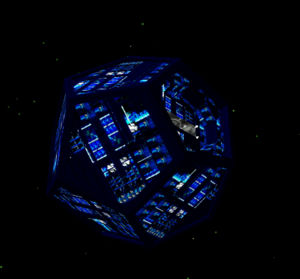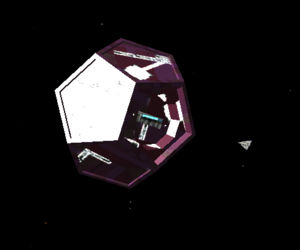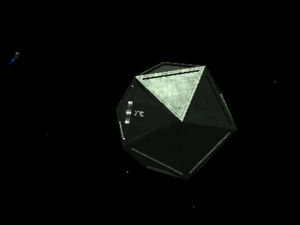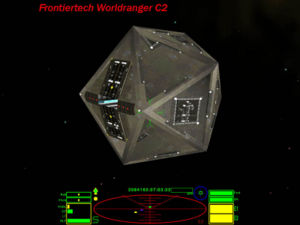Difference between revisions of "P.A. Groove Stations backgrounds"
(→Griff ICO base model) |
m (→FrontierTech Worldranger ICO: spelling correction - fist to first :)) |
||
| Line 101: | Line 101: | ||
Mr. Johnson, chairman of Frontiertech recently revealed the Frontiertech World ranger C2. The fist design was criticized by some planetary governments and costumers. The Worldranger Prototype 1 went never in production. 'Space Architecture Daily' described it as 'So ugly that Hell is more beautiful' | Mr. Johnson, chairman of Frontiertech recently revealed the Frontiertech World ranger C2. The fist design was criticized by some planetary governments and costumers. The Worldranger Prototype 1 went never in production. 'Space Architecture Daily' described it as 'So ugly that Hell is more beautiful' | ||
| − | The inhabitants of the planet Teraed where the | + | The inhabitants of the planet Teraed where the first to get this type of station in orbit but on seeing the first prototype raised their voice in protest. |
This obviously helped because Frontiertech learnt from the criticism. The whole design staff was replaced. Chief designer Aer Ri Ri Ro was very angry of this and it is rumoured that he has placed a bid on the head of Mr Johnson in one of the local space bars. Because of the situation Mr. Johnson is currently the best guarded man in the Teraed Hub sector (Galaxy 1) | This obviously helped because Frontiertech learnt from the criticism. The whole design staff was replaced. Chief designer Aer Ri Ri Ro was very angry of this and it is rumoured that he has placed a bid on the head of Mr Johnson in one of the local space bars. Because of the situation Mr. Johnson is currently the best guarded man in the Teraed Hub sector (Galaxy 1) | ||
Revision as of 00:57, 27 January 2010
Coriolis Variants
As The Coriolis stations became 'common sight' in the 8 Galaxies, local developers started to develop more variants. It was often the case that certain life-forms needed adaptations or the stations where altered for artistic reasons. Nowadays at least 9 variants are known. 8 versions from various independent manufactures are available
Other versions are the Gritty ones (see links in OXP-Overview). But these are not in this OXP. However I recommend them!
Griff Coriolis -X1
It soon became clear that the Lave prototype was VERY basic. Griff Research LTD was asked to improve upon the design. It soon became the new standard. For a lot of Lave prototypes Griff Research LTD came up with the Coriolis upgrade package.
The Griff-Coriolis -X1 offered several new features: - Advanced communication array with Spaceview lane surveillance tm. -.VSLS- Visual Space Landing System. These set of lights make it easier for rookie pilots to line up. -.Advanced ship storage. With the latest in space compression.
Griff- Metaforce Coriolis -X1
These are the upgraded standard Coriolis to Griff -X1 status. It looks different from the outside. The design is not as clean as the 'factory X1' as the materials and hull plating where shipped in from nearby systems of even made of raw materials mined from rock hermits
RaTech Gold Coriolis
RaTech (Leaded by Sun Ra Ra> a former Hoopy Casino owner who went into ship and station design) developed their
own version. This version had luxury Gold plating for artistic purposes. This is often regarded as a waste of materials. Inside these stations everything is luxury even on low-tech worlds. This makes a stay on this variant more pleasant than the standard versions. The 'Gold Bars' are often also equipped with slot machines and other games. The downside however is that maintenance is very difficult with all those non-standard parts.
Solar-Tec-Coriolis
This design is the most energy-clean design of all the Coriolis variants. The whole hull is composed of solar panels. As a result of this there are no internal generators. This saves space. Therefore these Coriolis Stations are often known to have all kinds of special features ranging from little zoo's, greenhouses to extra conference centers inside the station core. There are low and higher tech variants but a traveller can not see that from the outside.
Greenline Coriolis
The Greenline Coriolis originated by the same design agency of the Moray star boat (Marine Trench Co). Original first seen in orbit around oceanic worlds the design is now common around more types of planet and adapted for all life forms. The hull is more sturdy than other variants to withstand high pressure.
RedTec Coriolis
A newer variant, it can often be observed from far away because of it's distinctive red color. On the hull blue units can be seen, these are the new Envirocontrol TM units. Not only does this station use clean energy (Hull
takes in the solar energy like the SolarTec variants but in a more advanced way) it also produces almost no waste products other than the commodities that are stored and sold on the open market.
Waspline Coriolis
The insects' vision on a Corolius. Hive Intergalactic designed this variant. Internally the architecture is very different. But the design was good enough to be put to work also for other races.
Dodo stations
The Dodo stations are now common sight in high-tech systems. The first prototype of the basic GASEC model went into orbit around Leesti in 3138. At that moment the Leesti Coriolis was wiped out by a the comet Hal 9001. Scientists luckily predicted this impact a few months before the event after a major asteroid storm in the region. The new Dodo model could withstand impacts for much longer but it remains unclear why the new station was placed exactly in the same risky spot, probably for budget reasons. The Dodo-station proved to be a success.
GASEC Blue Dodo
GASEC formed a core team to design a blue DODO-station. Thanks to the advanced systems the ship capacity was increased. Engineers where very proud of the new DD1 central nanomainframe which was so small it had to be maintained using a microscope or by new nanotechnology. Small hull repairs are executed by nanobots.
The station was a prototype at first but was later made 'market-ready'.
Axtech Dodo
Axtech offered a cheap copy of the GASEC DODO without the nanotechnology. First prototype placed in orbit around
a far away planet in Galaxy 5. Soon it was discovered that the GASEC patent on the DODO design was not valid due
to the reorganisation of the GALCOP Patent office in 3143. The Patent application of GASEC was lost in the process. This all became clear in the DODO-GASEC vs Axtech trial in 3144. The outcome of the case was that it was allowed
to make copy's of the DODO design without the GASEC DD1 nanotechnology. The Axtech DODO is not a pleasant thing
to see. Axtech engineers designed the station with one thing in mind: quick and hard credits.
Trontech Vulcan (or LX 5 Dodo)
Trontech was a company out of Galaxy 5. The company was experimenting with camouflage techniques and developed a hull material which was almost invisible. The first Dodo's with these hull plating went into orbit around planets in known Thargoid war-zones. The first proto-station was known by the name LX5. Later it became known as Trontech Vulcan because of the red circuits that are visible when flying close to the station. It was rumoured that this circuits where utilized to 'cloak' the station. Trontech denied existence of such technology and the current model cannot cloak. Protoype LX5 went missing shortly after the rumours.
Trontech went bankrupt in 3189. Rumours say that the engineers where quickly offered a job in the design team that designed the Sec Comms for the Galactic Navy.
ICO Stations
The Icosahedral station, or ‘Ico’ was introduced in 3137 as part of the GalCop galaxy wide upgrade. GASEC was again offered a contract to design the new prototype. The original design again offered some innovations over the DODO. It was now possible to resize objects to a maximum of 65% of the original size (including ships) this resulted in efficient ship storage. So while externally ICO stations are about the same size of Coriolis and DODO stations it can store much larger quantities of cargo and ships, planets often needed just one in orbit.
Griff ICO base model
Griff Research LTD again raised the standard and came with the ICO. First known base model was ready in orbit around late 3137 around Teonan (Galaxy 2). The old station really was not up to the standards anymore.The ICO reduced station congestion by 50% in the first year it was introduced.
Worldbuilders inc ICO
Worldbuilders ICO recently refined the resizing technology in such a way that the station itself can be resized for transport to 60 % of its original size. However the disadvantage is that this can be applied only once because of risking structural hull damage.
Constellation ICO
The Constellation ICO is a normal station without the resizing tech but with a GASEC DD2 nanoframe. This results in very fast self repair. The design is great for planets plagued by asteroid storms.
FrontierTech Worldranger ICO
Mr. Johnson, chairman of Frontiertech recently revealed the Frontiertech World ranger C2. The fist design was criticized by some planetary governments and costumers. The Worldranger Prototype 1 went never in production. 'Space Architecture Daily' described it as 'So ugly that Hell is more beautiful'
The inhabitants of the planet Teraed where the first to get this type of station in orbit but on seeing the first prototype raised their voice in protest.
This obviously helped because Frontiertech learnt from the criticism. The whole design staff was replaced. Chief designer Aer Ri Ri Ro was very angry of this and it is rumoured that he has placed a bid on the head of Mr Johnson in one of the local space bars. Because of the situation Mr. Johnson is currently the best guarded man in the Teraed Hub sector (Galaxy 1)
From a technical viewpoint the Worldranger is state of the art and incorporates all techniques from the former stations. A design that is very durable that can be deployed quickly. And it looks good too!
